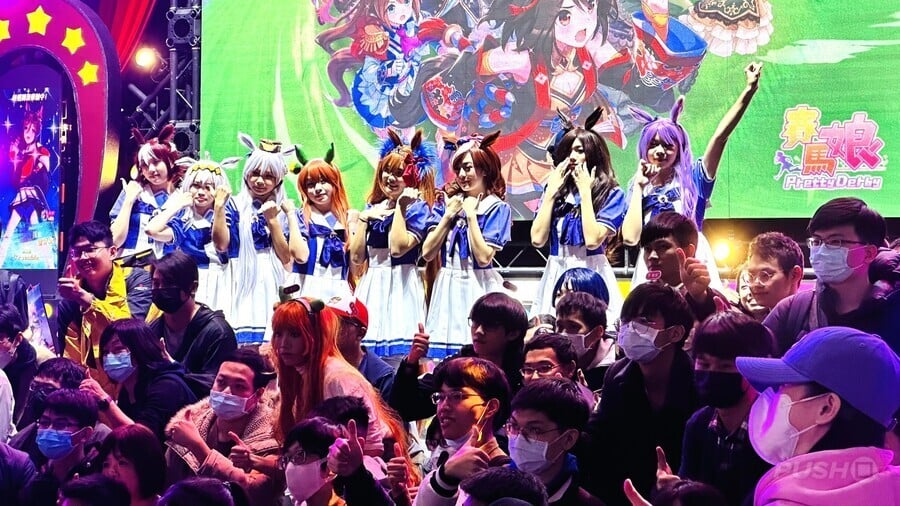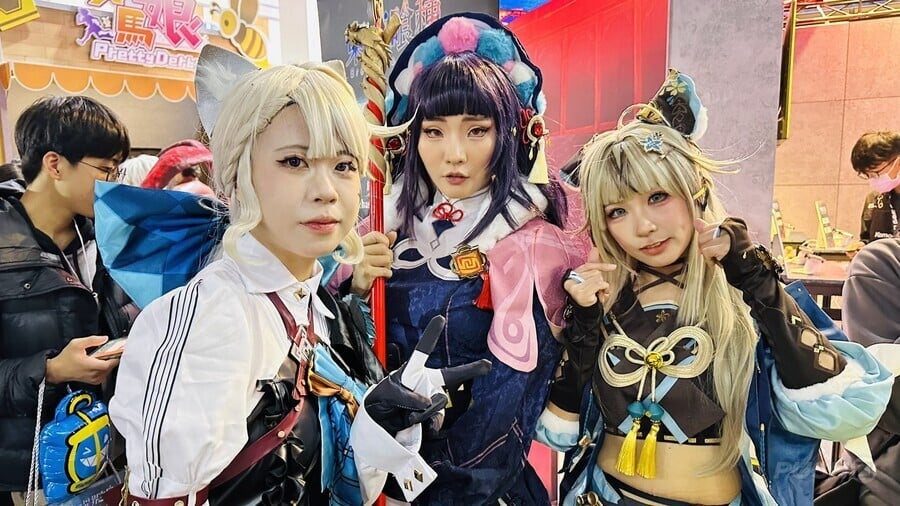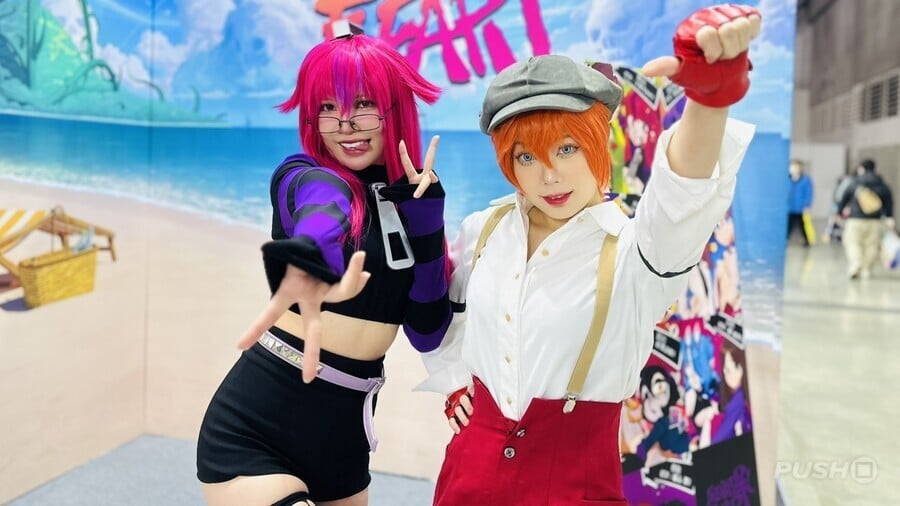
Taipei’s blue-hued Bannan Line is always packed to bursting, as it’s the approximately 26-kilometre MRT line which ferries passengers to key city destinations like Ximen and Taipei Main Station, but it was abuzz with added enthusiasm late last month, as enthused gamers rode the train all the way through to its destination station for the Taipei Game Show.
The Taipei Nangang Exhibition Center, or TaiNEX as it’s more colloquially known, has hosted the important industry event for several years now – but its origins, dating all the way back to 2003, are much more humble, as Public Relations Specialist Nana Chang from the Taipei Computer Association tells us.
Subscribe to Push Square on YouTube167k
“Taipei Game Show initially started as a section within a computer exhibition, eventually evolving into an independent event as the gaming community expanded,” she says. “So, it’s the largest and oldest gaming exhibition in Taiwan. It serves as an excellent platform for those aiming to expand from Taiwan to the international market or enter the Chinese-language market from overseas.”
Unlike the Tokyo Game Show, which is spread across the cavernous Makuhari Messe, the aforementioned TaiNEX adopts an unorthodox layout, where attendees need to ride a couple of elevators up to the fourth floor in order to reach the Taipei Game Show’s main hall. It’s in-keeping with Taiwan’s obsession with verticality; limited space means architects are always looking upwards.
The ride to the entry hall is decorated with posters of high-profile games, including smartphone sensations like Umamusume: Pretty Derby, underlining the local market’s penchant for gachas, as is consistent across the entirety of Asia. Console games also feature on the corridor’s hallowed halls, including Ubisoft’s recently released side-scroller Prince of Persia: The Lost Crown.
Even before infiltrating the actual show floor, we were conscious of the sheer volume of the Taipei Game Show. It’s not uncommon for conventions to pump up the music in order to attract passersby, but this was sound on another level; we weren’t forward-thinking enough to bring a decibel counter with us, but we’d hazard it was comfortably above 120db for much of the weekend.
Upon entering the event, we were immediately struck by the scale of its indie section, spotlighting developers not just from Taiwan but from right across Asia. “Local development teams in Taiwan are predominantly involved in indie game development,” Chang explains. “The Taipei Game Show allows them to gather player feedback and engage in mutual communication.”
Chang adds that the business zones, running alongside the main show in a more serene upstairs area, also provide the opportunity for indie game developers to find “ideal publishing partners, enabling their works to reach a global audience”. Of note, we bumped into ex-PS Studios boss and current Sony indies evangelist Shuhei Yoshida on the show floor, no doubt looking for PlayStation’s next big thing.
Despite being of critical importance to the local gaming industry, Chang admits that monetising the indie games, as well as the show’s tabletop-focused Board Game Wonderland, is tough. “It's challenging to generate profits from indie games and the board games,” she sighs. “Nevertheless, we’re continuing to expand these two special zones, with this year being the largest scale ever.”


Browsing the indie games section, we were shocked by the vast array of quality content coming out of Asia, including Taiwan itself. While we were already familiar with the work of Red Candle and its upcoming rhythm slasher Nine Sols – which won the Best Narrative award at the event, with PlayStation part of the jury – we were also impressed by the likes of Opus, a photography-focused narrative game from the Taipei-based SIGONO, and Minds Beneath Us, a dense sci-fi adventure created by a group of Taiwanese graduates.
Chang enthusiastically explains to us that she believes the “continuous passion of indie game developers is the cornerstone for driving the entire gaming industry forward”, and with so many unique and interesting projects on display, it’s hard to disagree. “We hope to extend our influence globally, encouraging more people to unleash their creativity and join this industry,” she beams. “This is of great importance to us.”
Perhaps unique to the Taipei Game Show is the impressive diversity of the experiences on display, and Chang attributes this to the varied tastes of the local market. “As a transportation hub in close proximity to the Chinese-speaking and Southeast Asian regions, Taiwan is known for its compatibility and diversity,” she explains. “These traits represent the most prominent and distinctive features of the Taipei Game Show.”
Indeed, venturing out of the indie section and into the rest of the hall reveals an almost dizzying array of different experiences, from the hugely popular Hong Kong-based mobile match-three puzzler Tower of Saviors through to more traditional console escapades like Dragon’s Dogma 2, distributed locally by Taiwanese publishing giant JUSTDAN.
“In the early years, Taiwan's gaming market was heavily influenced by a variety of classic Japanese works,” Chang tells us. “However, the gaming culture has persisted, and there is a tremendous acceptance for games of different cultures, types, and styles.” Even more Western-leaning releases, like Ubisoft’s The Division Resurgence, caught our attention by attracting sizeable crowds.
“I can proudly say that, whether it's Japanese, American, Korean, Chinese, or Southeast Asian cultural games, you can find them all here,” Chang continues, highlighting once again the diversity of experiences available at the show. “For global gamers looking to discover games they've never encountered before and explore new worlds, the Taipei Game Show is your best choice.”
But in our view, the attendees are as much a part of the experience as the games themselves. We were taken aback by the sheer number of cosplayers milling around the TaiNEX area all weekend, with Genshin Impact and Honkai: Star Rail characters proving particularly popular. Many of the costumes, intricately detailed and indistinguishable from their in-game inspirations, rivalled those worn by hired models, paid by publishers to attract attention to their booths.
While this year’s show was the largest in three years, Chang reveals it hasn’t always been plain-sailing for the organisers. “Faced with the severe challenges of the global COVID-19 pandemic, it posed a significant test for the Taipei Game Show,” she remembers. “In 2020, we had to make the unprecedented decision to cancel the event just days before its scheduled opening, which would have been the largest exhibition in our 20-year history.”




